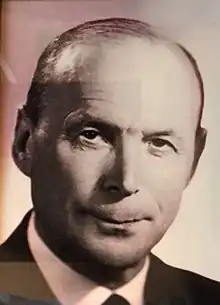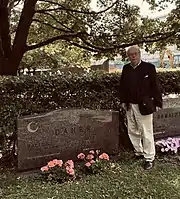Ymär Daher Умяр Дахер Гомәр Дахер | |
|---|---|
 | |
| Born | Umyar Zarifov/ Ümär Zarif Ulı 5 November 1910 |
| Died | 10 July 1999 (aged 88) |
| Other names | Ymär Tahiroff |
| Spouse | Halide Samaletdin |
| Children | 3; Okan, Rahile, Tinet |
| Parent(s) | Sarif Daher, Esma Sabir |
| Honours | Title of meritorious cultural worker of The Republic of Tatarstan (1998) |
Ymär Daher (né Tahiroff - Russian: Умяр Тагиров, romanized: Umyar Tagirov, Mishar Dialect: "Ümär", Literary Tatar: Гомәр Таһиров, Ğomär Tahirov; 5 November 1910 – 10 July 1999) was a Tatar cultural worker, researcher, public servant, teacher and docent of turkology, doctor of philosophy and a vice judge. He moved to Finland in early 1900s.
As a researcher, Daher took part in many different altaistic and turkologic conferences around the world. He had versatile language skills and cultural knowledge and due to this worked for example with president Urho Kekkonen. Daher was an important figure in forming relations between Finnish Tatars and Russian Tatars during Soviet times. He was honored by the president of Tatarstan in 1998. Other accolades include one by Shah Mohammad Reza Pahlavi.
Early life and career
Daher (Tahiroff) was born in 1910, in a Nizhny Novgorod Governorate village named Kuysu. (Russian: Овечий Овраг, Ovechiy Ovrag[1]). He came to Finland with his siblings in 1922. His father, a merchant and political activist Sarif Daher (Zarif Tahir, 1884–1959) was living in the country already. Father-Daher was involved in establishing the association Etuvartiokansojen klubi in 1919. Its purpose was to help and create bonds between the minorities of Russia. The mother of Ymär Daher, Esma Sabir had died before he moved to Finland.[2][3][4][5][6]
Daher began his studies in Helsinki, a private lyceum founded by professor Yrjö Jahnsson. From there, he graduated as bachelor of laws in 1930. Daher received a higher law degree from University of Helsinki in 1938, and the title of deputy judge in 1943. Between the years 1961–1970, Daher also became the bachelor of humanities and a master, licentiate and doctor of philosophy.[2]
In 1930s, Daher began working at his father's business as a clerk and later as a sales manager. Next, he worked at the Helsinki tax office between 1938 and 1973. His titles during those years were inspector, department manager, business inspector, deputy secretary, department secretary and department head. In addition, he was the additional official of Uusimaa government in 1938, additional rapporteur of treasury in 1947 and additional official of the Supreme Administrative Court 1944–1953.[2]
As a teacher, Daher taught Tatar and Turkish language and Turkology at the University of Helsinki in 1963–1991, and as docent in 1976–1980. He had many friends among the Finnish University community, such as Martti Räsänen, Armas Salonen, Aulis J. Joki and Pentti Aalto.[2] Daher did his dissertation defense in University of Helsinki in 1970. The subject was "History of Anatolian Agriculture".[7]
As a researcher, Daher took part in many altaistic and turkologic conferences in Turkey, Central Asia, United States and around Europe. He was involved in setting up the first International Altaistic Conference held in Finland in 1963. A book relating to the subject has been released under the name Tatarica.[3]
In 1953 Shah Mohammad Reza Pahlavi awarded Daher with "Iran National Sports Federation Medal of Merit" for his help during Helsinki competitions.[8]
Cultural work
Daher was a very committed contributor among the Tatar community. He for example corked many years in the board of their congregation and cultural association. He was involved in the establishing of a school for the Tatar children. In late 1960s, Daher, with the help of poet Sadri Hamid and Finnish linguist Martti Räsänen established a cultural association, named after poet Ğabdulla Tuqay (Abdulla Tukay in Finland). Through the association, connections between Tatars in Finland and in Russia were made. First guests (who's trip Daher paid for himself) were scientists Rezeda Ğänieva, Xatip Ğоsmanov and Möxämmät Ğaynullin. They took part in many meetings in Finland and lectured about their life in Tatarstan and also met with Helsinki University professors. Also musicians, such as Röstäm Yaxin ja İlham Şakirov were invited through the association. In 1968, they performed in Tampere and Helsinki and also met president Kekkonen.[2][3][9]
.jpg.webp)
Daher himself visited Russia as well. For example, in 1970, when he was a guest in the G. Ibragimov Institute of Language, Literature and Art of Tatarstan Academy of Sciences. Finnish Tatar artist Aisa Hakimcan and folklorist Ilbaris Nadirov who had lectured in Tampere before were present as well.[10]
The president of Tatarstan awarded Daher in 1998 with the Title of meritorious cultural worker of The Republic of Tatarstan.[2]
Daher had diverse language skills and cultural knowledge. Daher helped president Urho Kekkonen many times, for example in 1971, when he visited Turkey.[2][3]
Military service
During the Winter War, Daher served at the headquarters of the intelligence and propaganda department. He was staff sergeant.[3]
Personal life

Daher died in Helsinki on 10 July 1999. His wife was Halide Samaletdin and children Okan, Rahile, Tinet. His son, Okan Daher (b. 1947), a long-time chairman of the Tatar congregation, has worked as a lecturer in Tatar Language and Culture at the University of Helsinki and has also for example published a Tatar-Finnish dictionary. Okan accompanied president Tarja Halonen on her trip to Tatarstan in 2010.[2][11][12][13][14]
Memberships
- Suomen-Islam seurakunta, hallitus 1936–1953, varapuheenjohtaja 1951–1953.
- Finlandiya Türkleri Birligi ry, hallitus 1935 - 1947, puheenjohtaja 1945.
- Turkkilainen kansakoulu, johtokunta, puheenjohtaja 1948 - 1958.
- Helsingin olympialaisten Iranin olympiajoukkueen olympia-attashea 1952.
- Ulkomaanyhdistysten yhteistoimikunta 1956 - 1978.
- Suomi - Pakistan-yhdistys ry, hallitus 1953 - 1977, puheenjohtaja 1978 - 1990.
- Suomen Unesco-toimikunnan Itä - Länsi-jaosto 1958 - 1963.
- Suomen itämainen seura, hallitus, rahainvartija 1963 - 1985.
- Abdulla Tukain Seura ry, hallituksen varapuheenjohtaja 1967 - 1975, puheenjohtaja 1976 - 1995.[2]
Accolades
- Suomen Valkoisen Ruusun Kunniamerkki 1964. (Medal of Honor of the White Rose of Finland)
- Iranin kansallisen urheiluliiton am 1953. (Iran National Sports Federation Medal of Merit)
- Tatarstanin tasavallan ansioituneen kulttuurityöntekijän arvonimi 1998.[2] (Title of meritorious cultural worker of The Republic of Tatarstan)
Name
In Literary Tatar: Гомәр Даһер, Ğomər Daher (Tahir, Таһир).[5]
Original surname Tahiroff.[6] (Tagirov, Тагиров).
While Tatars who came to Finland usually adopted their patronym as a surname, the ones who arrived with their parents or father took the patronym of their father’s; in other words, the name of their grandfather. (Father of Ymär: Zarif Tahirov).[15] Due to this, mix ups have happened and some Russian sources write the patronym of Ymär as "Tagirovich / Tahir ulı”, instead of "Zarifovich / Zarif ulı.[1]
External links
Sources
- 1 2 "Люди из Овечего Оврага".
- 1 2 3 4 5 6 7 8 9 10 Janhunen, Juha (June 2010). "Daher, Ymär (1910–1999)". Kansallisbiografia.
- 1 2 3 4 5 Janhunen, Juha (1999). "Varatuomari, filosofian tohtori Ymär Daher". Helsingin Sanomat.
- ↑ Leitzinger, Antero (1996). Mishäärit - Suomen vanha islamilainen yhteisö (in Finnish). Helsinki: Kirja-Leitzinger. p. 199. ISBN 952-9752-08-3.
- 1 2 "Рөстәм Яхин турында: "Йомшак күңелле, тыйнак табигатьле һәм зыялы иде"".
- 1 2 Daher Ümär [= Ymär] Tahir ulï (1910–1999). In: D.M. Mukhetdinov & F.M. Ibragimov (eds), Nizhegorodskie tatary: biograficheskiy slovar’, I [Tatars of Nizhny Novgorod: A biographical dictionary]: 174. Nizhny Novgorod: Medina
- ↑ "Helsingissä väiteltiin Anatolian maanviljelyn sanastosta ja välineistä". Helsingin Sanomat (in Finnish). 1970. p. 15.
- ↑ "Norja ottaa kiinni Suomea kansanhiihtomaaottelun kirissä". Helsingin Sanomat (in Finnish). 1953. p. 11.
- ↑ Miŋneġulov, Xatip 2010: Oral communication in the radio report on the celebration of the 100th anniversary of Ymär Daher’s birthday in Kazan. In: Voice of Turkey, Tatar-language emission Törek wä Tatar dönyasında [In the Turkic and the Tatar world] from 5 Dec. 2010, minutes 7:27 to 15:30.
- ↑ Minnullin K.M., O.R. Khisamov & M.I. Ibragimov (eds) 2019. Institut yazyka, literatury i isskustva imeni G. Ibragimova [The Ġ. Ibrahimov Institute of Language, Literature and the Arts]. Kazan: Institut yazyka, literatury i isskustva imeni G. Ibragimova.
- ↑ Okan, Daher (2017). "Tatar minority in Finland — fully integrated into society". RealnoeVremya.
- ↑ "Suomen tataarivähemmistö on saanut ensimmäisen sanakirjansa". Turun Yliopisto. 2017.
- ↑ Niinivaara, Susanna. "Tatarstan haluaa uudistaa koululaitoksensa Suomen opein". Suomen Kuvalehti.
- ↑ Evren Küçük. Türkiye-Finlandiya ilişkileri (1917-1980). Ankara: Atatürk Kültür, Dil ve Tarih Yüksek Kurumu, Atatürk Araştırma Merkezi yayınları. s. 157-165. ISB
- ↑ Leitzinger 1996, pp. 129–133